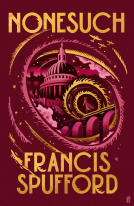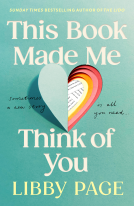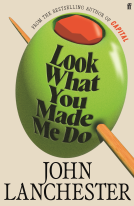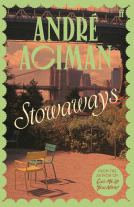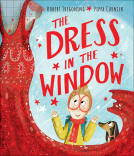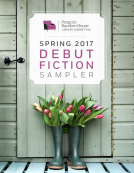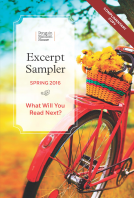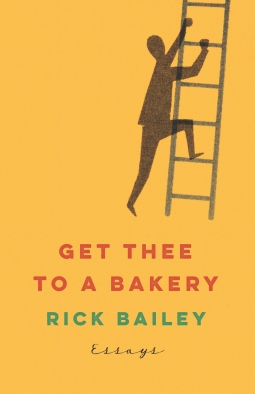
Get Thee to a Bakery
Essays
by Rick Bailey
This title was previously available on NetGalley and is now archived.
Send NetGalley books directly to your Kindle or Kindle app
1
To read on a Kindle or Kindle app, please add kindle@netgalley.com as an approved email address to receive files in your Amazon account. Click here for step-by-step instructions.
2
Also find your Kindle email address within your Amazon account, and enter it here.
Pub Date Mar 01 2021 | Archive Date Mar 02 2021
Talking about this book? Use #GetTheetoaBakery #NetGalley. More hashtag tips!
Description
Get Thee to a Bakery is a collection of short, tart essays that explore both humorous and harrowing aspects of growing older and making sense of social, technological, and environmental change. Topics range from earworms and industrial eggs to peaches and personal data, from bug die-offs to algae blooms and global warming, and from beards and yoga to the irrepressible American smile.
Many of these essays make discursive moves into science and literature, framing issues and conflicts that resonate in contemporary American life. With a conversational style, distinctive voice, and great comic timing, Bailey entertains and surprises.
Advance Praise
“Rick Bailey has a deft comic touch. He can make even a flooding basement or a power outage fascinating and hilarious. The world is a more interesting and far funnier place when seen through his eyes.”—Sharon Harrigan, author of Half
“Rick Bailey writes with a rare blend of intelligence and whimsy. Few essayists convey such joy in being alive. Bailey’s prose is sharp and the essays in Get Thee to a Bakery are as accessible as they are profound.”—Cal Freeman, author of Fight Songs
“Rick Bailey is an epicurean globetrotter, whisking us on a wholly satisfying culinary tour with equal measures of humor and heart. These short meditations on food, wine, music, place, and language are deliciously entertaining, a pleasure on the reading palate.”—Dorene O’Brien, author of What It Might Feel Like to Hope
Available Editions
| EDITION | Other Format |
| ISBN | 9781496225511 |
| PRICE | $19.95 (USD) |
| PAGES | 222 |
Average rating from 13 members
Featured Reviews
 Reviewer 671072
Reviewer 671072
Get Thee to A Bakery is a delightful series of thoughts and collection of essays, reminiscent of Bill Bryson’s travel reads. Bailey is an expert story-teller who deftly described a series of mundane events (like climbing a ladder or reading books before bed) with humor and insight. The dialogue between Bailey and his wife is laugh-out-loud worthy. Overall, this is the perfect ambling read for someone looking for a little laugh and a little perspective.
 Mithila M, Reviewer
Mithila M, Reviewer
I loved the essays in which Rick wrote about food. The history behind the specific dish, for example, piada dei morti (bread of the dead) and the history of using nutmeg all over the world and other such food related trivia were narrated brilliantly. The other essays were short and an easy read to pick up in between breaks, chuckle a bit, and then get back to another serious book/study material.
 Reviewer 211127
Reviewer 211127
Get Thee to a Bakery is a delightful collection of essays that, on the surface, seem simple in nature. They discuss the ordinary, everyday events that occur in a person's (in this case Baiiley's) life, such as cleaning out gutters, dental appointments, washing dishes, conversations with your spouse. And yet, each essay delves into a subject in a way that only the curious can, brimming with trivia, humor, and social and political commentary. So many essays landed on the top of my list, but when I made it to the end of the collection, I recalled these lines from "On Wine Tasting and the Limits of Winespeak," which at one point talks about the subjectivity in grading papers and what might constitute a grade of 87 versus one of 92. Bailey writes, "Words help. They can explain the 87 and 92. They also can get in the way. Did you like it? yes. Do you want more? Yes. Most of the time, that's enough."
Do I want more? Yes, Rick Bailey, I do.
Bravo!
 Reviewer 526728
Reviewer 526728
This book was hilarious and all too true. I saw myself in these essays far too frequently, but the book was never anything other than joyful.
Ah this was a delight. Overall a charming and fun essay collection with topics ranging from the little things in life—such as washing dishes—to the bigger things like growing older. I loved how the history and origin of food and words were explored. Diving into the little things, I suppose.
As the book goes on, a bond between writer and reader is built, which is shown in the essays by referencing previous stories. Like little inside jokes almost.
A great essay collection for people who pay attention to the small things in life, maybe even a little too much.
I thoroughly enjoyed this, there was a lightheartedness to the essays, Bailey conveyed every little detail of getting older in the most endearing way. I would reread this book and would highly recommend it to anyone, it was such a great and inciting read!
Thank you to the author, University of Nebraska Press and NetGalley for an ARC in exchange for an honest review.
I loved this collection of essays about marriage and relationships, aging, food, travel and musings on social and technological change. The author is curious about the world around him, and open to discovering and exploring new things - and it shows in this gently humorous, thoughtful and beautifully written book, which is a delight to read.
 Jenni V, Reviewer
Jenni V, Reviewer
Book 16 of my 2021 Reading Challenge
Get Thee to a Bakery
by Rick Bailey
Summary (via Goodreads)
published 2021
Get Thee to a Bakery is a collection of short, tart essays that explore both humorous and harrowing aspects of growing older and making sense of social, technological, and environmental change. Topics range from earworms and industrial eggs to peaches and personal data, from bug die-offs to algae blooms and global warming, and from beards and yoga to the irrepressible American smile.
Many of these essays make discursive moves into science and literature, framing issues and conflicts that resonate in contemporary American life. With a conversational style, distinctive voice, and great comic timing, Bailey entertains and surprises.
First Impressions/Judging a Book by Its Cover
I picked this book out on NetGalley (full disclaimer below) based on its description and bright cover. Essays and short stories, especially biographical ones, are always something I pick up with no hesitation so I don't really have any further impressions.
My Opinion
3 stars
**I received an electronic copy of this book via NetGalley and would like to thank the author and/or publisher for the opportunity to read and honestly review it.**
I read a few essays at a time over the course of a few days and it was a quiet, enjoyable way to pass the time. The author was able to jump in with a sense of familiarity that wasn't confusing. For example, he didn't give a biographical recap of his family but with his words was able to paint a picture that conveyed he was in an established marriage (not a newlywed) when talking about his wife.
The essays had a throughline but were not explicitly interconnected. I would read this author again.
 Erin F, Reviewer
Erin F, Reviewer
https://www.thelitpub.com/blog/oddities-and-pleasures-an-interview-with-rick-bailey
Mar 16 Oddities and Pleasures: An Interview with Rick Bailey
Erin Flanagan
EF: One of the things I admire most about these essays is how you’re constantly making unexpected connections and leaps. For instance, in “Don’t Wait,” you bop between your faltering hearing, the “what it is” salutation from a former student, a problem with your foot, the article your wife sent you on fashionable hearing aids, and reading The New Yorker. Can you talk a bit about how you create an essay? Where do you start, and how do you know what paths to follow? How do you know when it’s “done”?
RB: Where does an essay start? With a tidbit in the news, with something my wife says, with a piece of music that triggers a memory or arouses a curiosity. Why is this important? Why is it funny? What does it remind me of? Where does it lead my thinking as I walk through the day?
“Make the subject of the sentence you’re writing different from the subject of the sentence you just wrote.” That’s what Richard Hugo recommends in Triggering Town. Introduce multiple subjects. I followed that advice when I wrote poetry and then began to apply it writing essays. “You get 3-4 balls in the air,” a teacher once said. The trick is to keep them from falling on your head. In the piece you mention, “Don’t Wait,” failing hearing, that curious “what it is is…” locution I hear so much lately (reminding me of an eighth grader I taught in 1980), the thing on my foot. . . . It’s all-at-once-ness. When you think about it, that’s consciousness, right? We walk around thinking 10-15 things at once. They’re related and unrelated, random and connected.
I was driving my son to get his wisdom teeth removed the morning it was announced that Encyclopedia Brittanica would cease publication. That news triggered an essay in which I told the story of my son’s experience under the knife while also reflecting on those tomes I was so familiar with when I was a kid, which drove me to do some fact hunting about Brittanica, how long it was in publication, its shortest entry (woman: female of man), how it has been supplanted by information technology. What often happens when I’m managing multiply subjects is discovery in one thread triggers ideas and possibilities in the another thread I’m working on. I feel like I’m “done” when the two or three threads begin to converge, when I can weave them together in a satisfactory way.
EF: I love the idea of so many balls in the air, of so many different nodes of connection. Along with all these disparate ideas coming together, I see you’re writing a lot about finding balance too, for instance balancing purity and gluttony, health and desire. Having spent so much time in Italy, do you think this is a particularly American phenomenon?
RB: Yes, I think it is an American phenomenon. Especially if you’re from the Midwest. I grew up in a meatloaf family, in a farm town, where we went to the Methodist church and became very wary of sin. Very taciturn. Very modest. One mustn’t call attention to oneself. Then I married into an Italian family that was garrulous and noisy and very big-hearted. “We keep fast on Fridays during Lent,” my wife said of her home, where we sat down to a voluptuous feast that was a fast only in the sense that there was no meat. And after dinner, when we pushed back from the table, her mother and father told family stories and laughed until they cried. It was a different universe. I was (and am) so lucky. I’m still a child of the Midwest, somewhat modified.
EF: Yes! I see that as another kind of balancing here: your Midwestern upbringing and your ties to Italy. Your time in Italy figures prominently in the book, and especially your interest in the language. You mention learning Italian through reading women’s fiction, and how there’s a humility to it. Can you speak to what learning other languages has taught you, and how it’s maybe changed (or not) your relationship with English?
RB: “You seem like a different person when you speak Italian.” One of my colleagues said that to me one night. We were in a restaurant in Florence. At the time I was doing 7-day excursions in Italy with small groups involving what I called “heroic eating.” His remark called to mind something I had been thinking about.
I was lucky to learn Italian in the home, from my wife and her parents. Over time I learned what my wife likes to call “the song,” the rhythm and intonation and phrasing of a language that’s not accessible on the page but alive in your ear. When I said to wait staff in a trattoria, “What do you have that’s good?” I said it the way my Italian family would say it, loading the question with enthusiasm and passion. There was a performance aspect to it, a kind of impersonation. If you have an immersion experience, for me 44 years of marriage, you gradually get the song right. But you have to be willing to get things wrong, to appear foolish. On a train over there years ago, I said something to a nun that made my wife and her cousin howl with laughter. Another time I announced I was going to become the Pope. In a bar I told someone I first came to Italy in the 15th century.
EF: I haven’t yet hit double-digits in my marriage, but am continually learning that lesson about the willingness to be wrong. Forty-four years married, wow. Obviously you and your wife have grown and changed a lot over those years, and I see that aging comes up throughout the book. I love that you talk about it in so many different ways—sometimes positively, sometimes negatively, sometimes matter-of-factly. One of my favorite lines in the book is when you mishear your wife and write “a word can be Rorschach test . . . you make of it what you will.” There’s something so charming and positive about this. Aging has obviously entered as a subject you write about, but I’m wondering, has it also changed your writing process?
RB: On one hand, I sometimes feel a sense of urgency. In her 80’s my mother disappeared into dementia. I think about that. I think: I should write every day. I should capture memories and the fleeting oddities and pleasures of right now. On the other hand, that urgency, that decision to write, is just part of daily life. All the years I taught writing online, I wrote every day, with and for my students. Since then I’ve blogged for a number of years, which is part of the daily practice, the regular regimen.
EF: What a wonderful thing to have made a practice. Along with aging, I noticed technology and its advancements are a thread through the book. You say in “We’re Melting” that “humans are at war with the natural world.” You mention this in relation to the weather and the hardships of being outside when it’s less than pleasant, but I kept thinking of it in wider terms. Can you talk a bit more about your idea of humans in conflict with nature and how technology comes into play?
RB: Well we certainly have the sense of a ticking time bomb, right? We try to manage nature, all along with a sense of dread. Nature is going to come back and take a terrible vengeance. I read a story the other day about chicken in a test tube: lab-created chicken-ish meat that will be nutritious and environmentally friendly. Just think how excited those lab technicians and food engineers must be, how geeked by the tools they are using, for the betterment of human kind, to be sure, but also with deep engagement and satisfaction with the tools at their disposal. You just think, what about that oops moment. Will that come? We make mistakes, we flub, we cannot anticipate all the consequences of our actions. With tech we alter the world and we alter ourselves. My grandkids are born into a device-ified world. They will not learn to read the way I did. They will not read the way I did. I no longer read the way I did. What impact is tech having on deep cognitive structures and habits of mind? It has always been the case: the world we occupy is thick, complex, evolving, and we have always engaged with whatever tools we have available. My gosh, the sextant, the telescope, the microscope, enlarged understandings and greater human capabilities. I remember reading Rime of the Ancient Mariner, asking the question, Why does he shoot the albatross? Because he’s holding a crossbow. The tools make us do it.
EF: And yet I’m thinking back to your first answer, about how you make those connections between ideas to form an answer, and it gives me hope the computers and lab chickens won’t complete make us obsolete. I’m sure there’s no specific answer for this, but I’m wondering how long you go between living and experience something and then writing about it, or how you know when you’ve got the narrative distance to tackle a subject.
RB: My wife and I were taking one of our long Covid walks a few weeks ago. We were discussing—I should say arguing about—whether it’s safer to step off the sidewalk into the street when another walker is coming toward us or merely move a few feet off the edge of the walk and turn our heads to avoid the contagion. What are the chances of getting hit by a car vs. inhaling the virus? Over the next day or so I wrote on that what-are-the-chances theme, which caused me to remember crossing the Irish sea in 1974, from Hollyhead to Dublin, arriving the morning after a bomb went off. What were the chances? That experience in Ireland had been sitting there, in memory, for decades. It was a pleasure to examine it, to tell that story, and to frame it in the present moment.
I probably tend to lounge around a subject rather than tackle it. In The Enjoy Agenda, my second book, there are a couple essays in which “tackle” might apply, one essay going all the way back to high school (how’s that for distance?), another addressing “shortism,” the size-related bias humans seem hard-wired for, like racism or sexism. I needed distance on that subject. Still do.
EF: Like above, I noticed these discussions or “arguments” with your wife set off a lot of your wonderful tangents in your essays. Your wife figures prominently in many essays, and I read her as somewhat of a long-suffering woman who both loves you and is annoyed by you. Is it difficult to portray someone you know so well when there’s no way to fully incapsulate them on the page? How do you go about turning a real person into a character in your work?
RB: I’m a very annoying person. She is long-suffering. She is also extremely private, so I take a minimalist approach to presenting her in my writing. My capture mode is mainly dialogue. People who know us will say: In your books, that’s just what you two sound like. In my writing you will know her by her reading and our ordinary interactions that pack married life. She reads everything and she remembers everything she reads. And she is a great summarizer and explainer. Sometimes it’s hard for me to get a word in edgewise. So in many of the essays, she’s kind of a straight man for me. My three collections, I’m getting my edgewise words in.
Get Thee to a Bakery is a collection of short stories about becoming old. The first few stories were interesting, such as fear of heights, the groans and sighs, improvement in taste and fight with the squirrels etc. Not all stories were interesting so that reduced the pace of my reading. This book could have done better with careful selection of stories so that the readers's interest was maintained.
Readers who liked this book also liked:
Marie Bostwick
Historical Fiction, Literary Fiction, Women's Fiction

